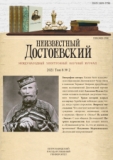Эффект «Пушкинской речи» в русской журналистике
The Effect of the Pushkin Speech in Russian Journalism Vladimir A. Viktorovich
Author(s): Vladimir Aleksandrovich ViktorovichSubject(s): Media studies, Russian Literature, 19th Century, Philology, Theory of Literature
Published by: Петрозаводский государственный университет
Keywords: reception of Dostoevsky’s Pushkin Speech; history of Russian journalism; problems of interpretation; axiology; panhuman;
Summary/Abstract: The article presents a systematic analysis of the Russian press of 1880, which actively responded to Dostoevsky’s Pushkin Speech. The interpretive boom around his speech is of particular interest for the study of the formative processes of public and national consciousness in Russia. In the history of journalism, the debates that took place at that time can be equated with modern information wars. At the same time, this episode is one of the decisive ones for the ‘Dostoevsky problem’ in criticism and, more broadly, in the Russian public consciousness. The “Pushkin Speech” was obviously of a unifying nature, but it, and even more so the 1880 “A Writer’s Diary,” caused a severe split in journalism, which reflected the mindset of the Russian society. At first, there is a change of semantic accents in telegrams and correspondence, and then the key concept of «panhumanity» is presented exclusively as a “dream” in publications opposing Dostoevsky, one that is not only incompatible with reality, but also distracts from pressing socioeconomic problems. There is also an expansion in meaning in the form of the notorious “messianism” of Dostoevsky. The most commonly used concept used by journalists that are hostile to the writer is mysticism as a euphemism for faith. In parallel, a different understanding of the Pushkin speech is being formed in some publications (Mysl’, Nedelya, Novoe Vremya, a little later — Rus’). It views it as a verbalization of the national idea in its focus on the panhuman as a feasible ideal. The dispute that ensued around Dostoevsky’s speech led to the self-determination of the leading trends of Russian thought.
Journal: Неизвестный Достоевский
- Issue Year: 8/2021
- Issue No: 2
- Page Range: 122-156
- Page Count: 35
- Language: Russian

